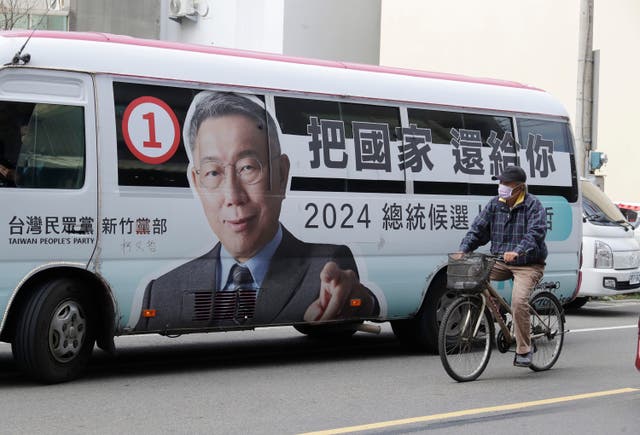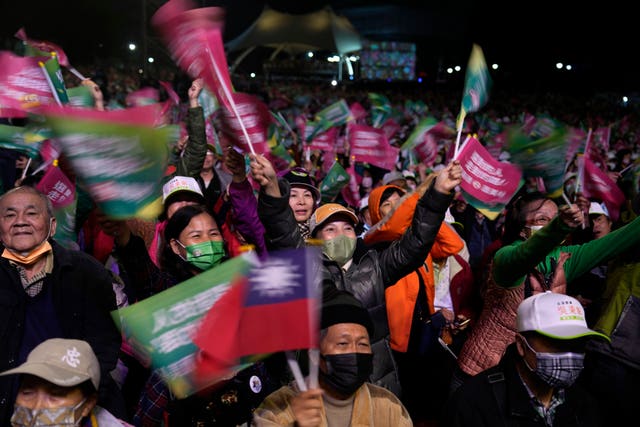
Matthew Wright 7am - 10am
10 January 2024, 08:14

Some candidates in the elections favour unification with Beijing.
China is being accused of deploying a broad strategy to influence voters in Taiwan’s elections to pick candidates who favour unification.
China’s ultimate goal is to take control of the self-governing island democracy, whose high-tech economy supplies key components for computers, mobile phones and other electronic devices and ships much of the world’s goods out from the Taiwan Strait.
Beijing has long insisted Taiwan is part of China and must be regained, by military force if necessary, regardless of the views of the island’s people.
Taiwanese foreign minister Joseph Wu says China’s “global objective is that they want to use Taiwan as a test ground.
“If they are able to successfully shape the results of the Taiwan elections, they will try to apply their tactics on other countries.”
China has been sending warships and fighter jets near Taiwan on a near-daily basis in recent years, hoping to intimidate the island’s 23 million people and wear down its military, which relies heavily on support from the United States.

China has described Saturday’s elections as a choice between war and peace.
While the numbers of such missions have dropped off slightly in recent days, Taiwan has reported a number of suspicious balloons traveling over the island from China.
The defence ministry also sent out an air raid alert via mobile phones about a Chinese rocket launch om Tuesday that it later amended to describe as the placement of a satellite into space but on an “abnormal trajectory”.
It said the alert was justified by the potential threat to civilians on the ground in Taiwan.
Previous efforts to intimidate Taiwanese voters with missile launches and direct threats were largely seen as backfiring after the election of China critics in 1996 and 2000.
China has also restricted imports from Taiwan and invited local leaders on all-expenses-paid visits aimed at persuading them to press colleagues to support pro-China candidates in the elections for the island’s president and 113-member legislature.
Cases have been opened against dozens of ward officials for accepting such gifts in violation of Taiwanese law.
China in general refuses to acknowledge the legitimacy of Taiwan’s political institutions in keeping with the Communist Party’s insistence that the democracy does not exit.
In line with that policy, China has not commented on Taiwan’s upcoming elections.
However, the head of the Chinese Cabinet’s Taiwan Affairs office, Song Tao, said on January 2 that China would continue to “unswervingly oppose” Taiwan’s independence while also working to “safeguard peace, expand exchanges, enhance cooperation, deepen integration and advance reunification to ensure that cross-Strait relations move in the right direction of peaceful development”, according to the official Xinhua News Agency.
Surveys show most Taiwanese embrace their current de facto independence, including compulsory military service for all men, the ability to travel worldwide on Taiwanese passports, and the right to choose their leaders in democratic elections at all levels.

While the race remains tight, support is strong for the ruling Democratic Progressive Party, even though China has refused to engage with the government since President Tsai Ing-wen was elected in 2016.
She is unable to run again due to term limits.
The DPP favours closer ties with the United States as a way to preserve Taiwan’s separate status and has refused to agree that Taiwan falls under the sovereignty of the People’s Republic of China, which has never exercised political control over the island or its outlying territories.
The DPP’s presidential candidate, current Vice President William Lai, leads most pre-election surveys.
The main opposition Nationalist Party candidate, Hou Yu-ih, is appealing to voters who fear a military conflict with China that could draw in the US and disrupt the global economy.
Mr Hou opposes Taiwanese independence and agrees with Beijing’s view that Taiwan is part of China, although under separate governments.
A third candidate, Ko Wen-je of the Taiwan People’s Party, has sought to straddle the differences by appealing to young voters turned off by the rivalry between the Nationalists, also known as the KMT, and the DPP.
However, Taiwanese elections are often decided on the basis of local issues such as housing, employment, education and healthcare that are separate from relations with China.
Taiwan, long a melting pot of Asian and European cultures, was a Japanese colony for 50 years until 1945, when it was handed over to Chiang Kai-shek’s Chinese Nationalist government at the end of the Second World War.
The Nationalists relocated their government and military to the island in 1949 after the Communists under Mao Zedong took power on the mainland amid a civil war in which millions were killed and which has yet to be formally resolved.
China accuses the US of encouraging Taiwan to raise tensions between the sides by supplying it with military weapons.
“Any attempt to use Taiwan to contain China is doomed to failure,” Chinese defence ministry spokesperson Colonel Wu Qian said at a briefing in Beijing last week.
“Seeking independence by military force is a dead end.”
China’s armed forces would “as always take all necessary measures to firmly safeguard our national sovereignty and territorial integrity,” he added.
The non-profit Taiwan Fact Check Centre says fake news linked to the elections has been traced to China and the pressure is increasing.
Online postings described as deep fakes have depicted Ms Tsai and Mr Lai as doing and saying things that were entirely fabricated.
“The creators of false information have their own motives,” said the centre’s chief executive, Eve Chiu.
“They are all false accusations related to politics.”
Beijing-sponsored visits to China by district wardens, equivalent to city and county representatives in the US, have also raised concerns in Taiwan.
Several officials are being investigated on suspicion they accepted free accommodations, travel and entertainment in return for promoting pro-China candidates.
That would violate Taiwanese law, which was carefully written to end a legacy of vote buying and voter coercion.
Among the visitors to China was the Nationalist Party’s vice chairman, Andrew Hsia, who travelled there last month, reawakening concerns about private dealings between the party and China’s ruling Communists.
Taiwan’s Mainland Affairs Council, which oversees relations with China, has warned Taiwanese that China is using both economic and political means to impact the vote.
“We advise the Communist Party of China to stop using ineffective means and stop harming relations across the Taiwan Strait,” spokesman Chan Chih-hung said.
He added that China is likely to keep trying to manipulate Taiwanese politics regardless of the election’s outcome.